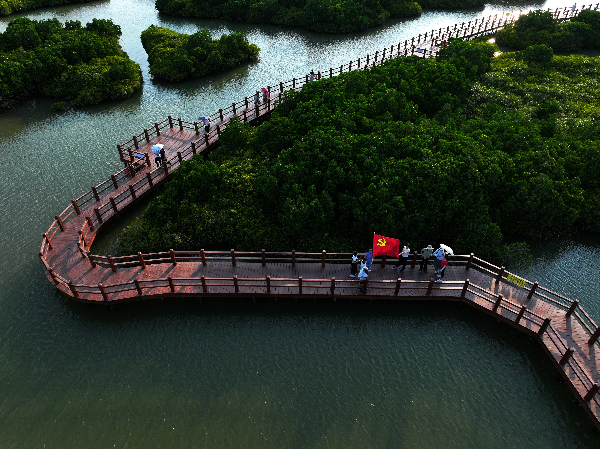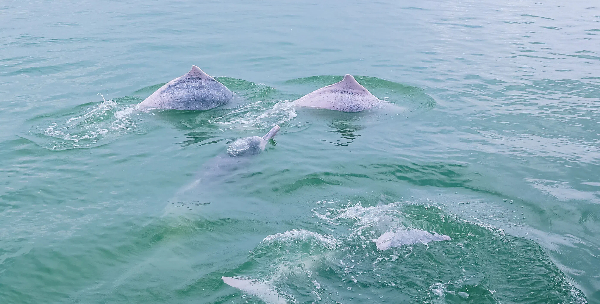Dolphins and mangroves symbols of Zhanjiang's ecological achievements
Editor's Note: This year marks the 75th anniversary of the founding of the People's Republic of China, and to celebrate, we are publishing a series of stories illustrating how Zhanjiang city in Guangdong province has advanced Chinese modernization. The following is the fourth story in the series.
While groups of Chinese white dolphins frequently surface to breathe, frolic or forage, creating ripples and audible sounds in Leizhou Bay, Zhanjiang in Guangdong province, mangroves, a common scene in the coastal city, stand in clusters, offering food and protection to various wildlife.
The Chinese white dolphin, a national first-class protected species known as the panda of the sea, is highly sensitive to marine ecosystem. Leizhou Bay hosts the world's second-largest population and their frequent sightings reflect the excellent marine environment and ecosystem in the city.
Zhanjiang, surrounded by the sea on three sides, has a marine area of 21,000 square kilometers and a coastline of 1,195.26 km. The coastline accounts for 29.26 percent of Guangdong's total. The city's stringent measures of pollution control and ecological preservation have enabled over 94 percent of the waters in coastal areas to maintain outstanding quality in recent years, ranking among the best in the province.

Zhanjiang boasts the largest natural reserve of mangroves in China. [Xiao Zili for chinadaily.com.cn]
With 6,521.85 hectares of mangroves, 59.3 percent of the province's total, Zhanjiang is reputed as the "City of Mangroves." Like Chinese white dolphins, mangroves also speak volumes for the city's achievements in marine ecological protection.
As its marine economy grows, Zhanjiang has intensified marine ecological protection. It has established a comprehensive governance system for coastal pollution, focusing on aquaculture pollution control and beach clean-ups. Enhanced law enforcement collaboration includes information sharing and joint patrols in key areas to combat illegal maritime activities.
Second, Zhanjiang is dedicated to protecting the Chinese white dolphin by enhancing marine ecological protection and restoration. The city has been focusing on rehabilitating key areas, including Zhanjiang Bay, Bomaogang Bay and Wailuo Bay, to create better habitats for the dolphins and other rare marine species.

Leizhou Bay in Zhanjiang boasts the second largest population of Chinese white dolphins in China. [Photo provided to chinadaily.com.cn]
Third, Zhanjiang has been enhancing protection and restoration of its mangroves. The city is establishing two 10,000-mu mangrove demonstration zones respectively in its subordinate Leizhou city and Xuwen county and creating mechanisms to realize the value of ecological products. It aims to transform the ecological value of mangroves into economic benefits while promoting them as carbon sinks and tourist sites.
With the largest and most concentrated mangrove natural reserve in China, Zhanjiang set the goal of becoming the City of Mangroves at the end of 2021, with the aim of highlighting the ecological significance of mangroves. So far, Zhanjiang has planted 1,372 hectares and restored 1,553 hectares of mangroves, completing 70 percent of its restoration tasks.
Besides, Zhanjiang is promoting ocean protection within the community by implementing incentive mechanisms to attract social capital for marine ecological restoration. Policies to encourage private investment in coastal protection and regular campaigns have raised locals' awareness of marine issues. Initiatives such as "clean beach protection" have helped to foster a strong commitment to preserving beautiful bays among the locals.
In recent years, 22 local enterprises and over 440 workers have taken part in the "Hundred Enterprises Clean Beach" initiative on Donghai Island near the Chinese white dolphin habitat. Various college clubs have also formed a volunteer alliance to promote the protection of the dolphins.
Since last year, Zhanjiang has launched seven major actions for the "Green and Beautiful Zhanjiang" initiative, including enhancing forest quality, developing the "City of Mangroves", promoting urban-rural greening, improving protected areas, upgrading green corridors, safeguarding ancient trees and encouraging community involvement in greening efforts.
With all the efforts, Zhanjiang's ecological environment has seen significant improvements. The city's 2024 government work report shows that in 2023, it ranked second in the province for air quality; 100 percent of the water at all the seven surface water sections (sites) under national monitoring program and 95.8 percent of the coastal waters were rated excellent last year, a record high in recent years.
The city also completed 27.5 km of waterside greenways and optimized 29,000 mu of forests in 2023. Five marine ecological restoration projects and 11 "Green & Beautiful Guangdong" demonstration sites are underway.



 Print
Print Mail
Mail

